It seems highly unlikely according to the latest results from SWE’s COVID-19 survey.
Overall, almost one-third (31%) of women and genderqueer/non-binary SWE professionals reported experiencing some sort of negative interaction more frequently during virtual meetings than they did during in-person meetings while about half reported the same frequency of such interactions in current virtual meetings as those held in-person. More recently, a New York Times article reported that while technology such as Zoom and other virtual meeting platforms are perceived to bring about more gender equality, this notion is further from the truth.
As the article and our findings indicate, remote work and specifically, virtual meetings, may exacerbate gender inequality such that women experience getting talked over, interrupted, or ignored more often in these formats than they did in-person before the pandemic.
“I feel like I’ve been isolated more being at home and feel disconnected from the workplace. During virtual meetings, it seems like my peers are kept updated more than me (I’m the only female in my 9-person department).”
–SWE Professional
Who reports more negative interactions?
In response to SWE’s survey, a higher proportion of younger SWE professionals (ages 18-24 and 25-34 years old) than SWE professionals aged 55-64 years old reported getting ignored, interrupted, and talked over more frequently during online meetings than those held in person (see Figure 1). As Figure 2 shows, women and genderqueer/non-binary professionals who reported not being married or living with a partner were more likely to experience negative interactions than their married or partnered counterparts more often during virtual meetings.
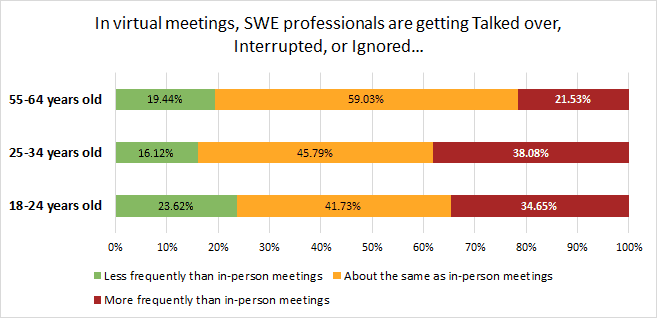
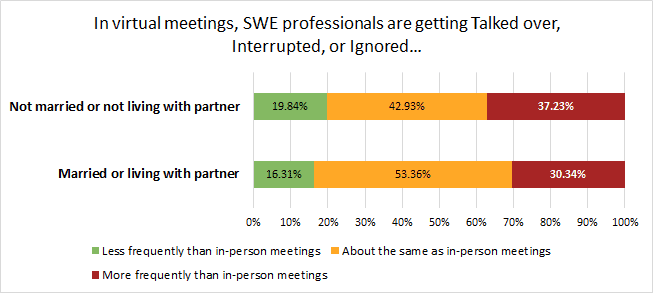
However, our findings show that women and genderqueer/non-binary professionals with children were as likely as their counterparts without children to experience more negative interactions during online meetings than in-person meetings. Similarly, the number of years SWE professionals have been employed at their work organizations also had no influence on whether they experienced more instances of getting interrupted, talked over, and ignored during virtual meetings than in-person.
Although SWE professionals of color are as likely to report similar frequencies of getting interrupted, talked over, and ignored in virtual meetings as their White peers, we note that women of color and genderqueer/non-binary SWE professionals of color disproportionately report other concerns. For instance, a higher proportion of SWE professionals of color than their white counterparts are concerned about losing their job due to the economic impact of COVID-19 as seen in Figure 3. We must recognize that SWE professionals of color confront multiple forms of exclusion in engineering (and STEM) that have been present prior to COVID-19 and have only been unveiled by the pandemic and protests against the continued oppression of Black people in the U.S.
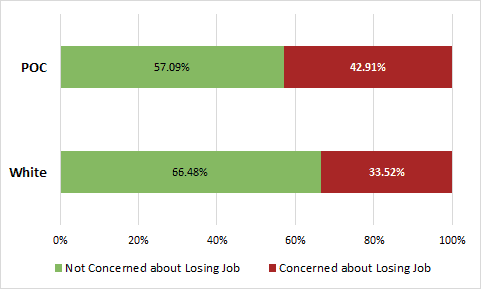
Why are these experiences important?
Moreover, these frequent negative experiences during virtual meetings are associated with other perceptions, including concerns for losing and finding another job during the pandemic (see Figures 4 and 5). A higher proportion of SWE professionals who experienced being talked over, interrupted, or ignored more frequently during online meetings than those held in-person also report feeling more dissatisfied with their work-life balance. Perhaps SWE professionals that experience more interruptions, getting talked over, and ignored during virtual meetings feel the need to be perceived as (more) competent as their peers, so they compromise their work-life balance to do so. Indeed, some of the research highlighted by the NYT article does provide some support for this, such that one study found that men are perceived to be more competent when they spoke more.
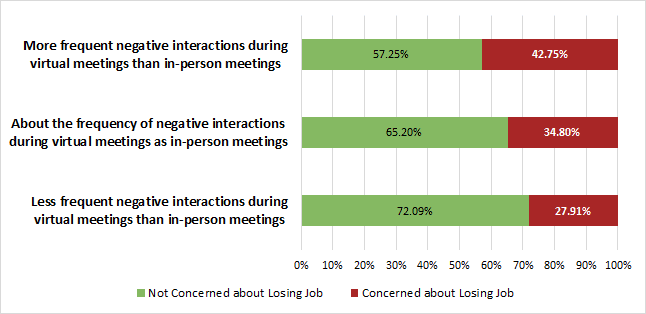
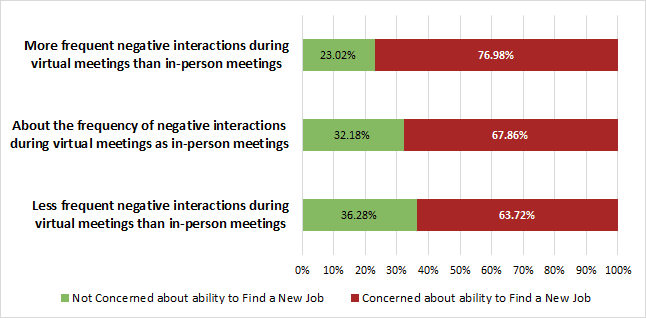
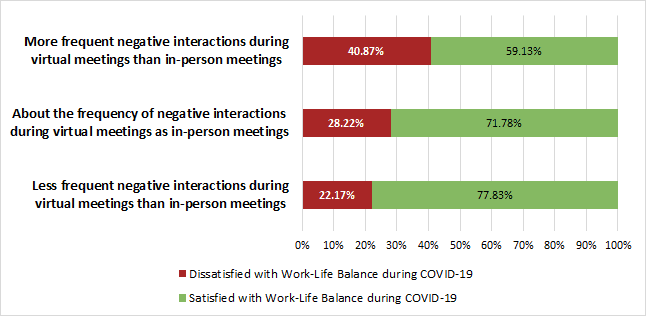
In other words, COVID-19 has not only revealed the gender bias in interactions and experiences during workplace meetings, but it has also exacerbated them with the move to online meetings. Fortunately, there are steps that individuals and workplace organizations can take to try to mitigate some of these gender biases. Neela-Stock lists four ways to become a better ally for women, including motioning for leaders to set the tone and make it a priority to listen to women’s voices. Further, male colleagues should speak up when they see these biases (e.g., women being interrupted, talked over, or ignored) taking place. Similarly, women should also support other women colleagues as there is strength in numbers.
Neela-Stock explains that Dr. Brazaitis, an associate professor in the Organization and Leadership department at Columbia University’s Teachers College, deems it “more effective for other people to point out that a woman is being interrupted as the group will be more likely to view it as a legitimate problem and not something the woman caused” as a way for male and female colleagues to collectively support women who are interrupted, talked over or ignored during meetings.
The last recommendation is for women to advocate for themselves, and while some SWE professionals have certainly done so (see quote below), workplace organizations should also have procedures and guidelines in place to minimize the number of occurrences women are interrupted, talked over, or ignored during meetings, regardless of format (i.e., virtual and in-person).
“As an Asian American woman in a conservative engineering industry, I believe that virtual meetings have affected my ability to be heard and has helped me learn the need to take action to have my voice heard.”
–SWE Professional
References
Gupta, A. H. (2020, April 14). It’s Not Just You: In Online Meetings, Many Women Can’t Get a Word In. The New York Times. https://www.nytimes.com/2020/04/14/us/zoom-meetings-gender.html
Neela-Stock, S. (2020, May 2). How to be a better ally to women on Zoom. Mashable. Retrieved July 6, 2020, from https://mashable.com/article/how-to-be-a-better-ally-on-zoom/
Related Content:
"bring" - Google News
July 23, 2020 at 10:26PM
https://ift.tt/2D4XrK5
Does Remote Work Bring About Gender Equality? - All Together - Society of Women Engineers
"bring" - Google News
https://ift.tt/38Bquje
Shoes Man Tutorial
Pos News Update
Meme Update
Korean Entertainment News
Japan News Update
Bagikan Berita Ini















0 Response to "Does Remote Work Bring About Gender Equality? - All Together - Society of Women Engineers"
Post a Comment